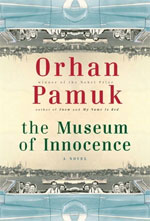
Before The Museum of Innocence, the only other Pamuk I’d read was Istanbul, his wistful and somewhat depressing memoir and cultural history of the city. I appreciated the craft of Istanbul, but it was ponderous going at times. There are definitely connections between Istanbul and The Museum of Innocence, and not just in the detailed portrait of the colourful and exotic city. At several points throughout the book, I was ready to conclude that The Museum of Innocence just might be the wistfulness and inwardness of Pamuk’s memoir taken to a verging-on-satirical extreme. Long after leaving the last page of this book, and probably when I revisit and re-read it, I suspect I’ll still be debating how satirical and self-absorbed versus heartfelt this book’s protagonist is meant to be.
Wealthy thirtysomething Kemal Basmaci is engaged to an accomplished woman his age. They are both members of prominent Istanbul families and travel in Westernized society circles. By chance, Kemal encounters a beautiful young shopgirl, Fusun, who is both a distant relative and at 18, at an almost Lolitaesque distance from him in age. He pursues her, they embark on a brief but passionate affair, and when they part, Kemal remains and in fact grows increasingly obsessed with and depressed about losing the young woman. After trying half-heartedly to reconcile with his fiance, he decides to abandon her and his high society life to attempt an unusual and protracted wooing of Fusun, venturing into her lower middle class neighbourhood and life and becoming intimately entangled in but also welcomed into her family’s day-to-day life. Is Kemal heroically and self-effacingly devoted to Fusun, or unnaturally obsessed with some crazed notion of her as a romantic ideal? Is he passionately in love with the real Fusun, or is he just mired in a form of self-absorption in which Fusun is some wildly distorted romantic icon? Is his increasingly compulsive hoarding of any and all objects associated with his beloved a creative and all-encompassing tribute, or a warped form of romantic kleptomania? The painstaking detail with which Kemal catalogues his devotion/obsession makes this over 500-page novel engrossing at times, wearying at other times. However, in its last scenes, Pamuk skillfully pulls the book together with an elucidating and validating refocus on Kemal’s obsession, along with a charming switch in voice. The apotheosis of Kemal’s love for Fusun takes the form of a museum. To further inspire and inform his mission, Kemal wanders the world visiting and researching museums of every shape, size and subject matter, from the sublime to the ridiculous, perhaps skewed to the ridiculous. However, in even the most obscure and overwrought collections and forms of tribute, Kemal finds justification for his passion, and the account of his travels and explorations is surprisingly moving. When he gets to Sir John Soane’s Museum in London, England, I was convinced, having recently had the privilege to view firsthand a place in which obsession, obsessive collecting and curating, and uncommon passions are made so memorably and claustrophically real. Perhaps the following is a spoiler … At the very end, Orhan Pamuk inserts himself in witty fashion as a character in the book. The change in voice is a bit of a relief after such a long, emotional journey with the protagonist, and allows the reader to step back with some measure of objectivity from this feverish story. “One could gather up anything and everything, with wit and acumen, out of a positive need to collect all objects connecting us to our most beloved, every aspect of their being, and even in the absence of a house, a proper museum, the poetry of our collection would be home enough for its objects.”See also:
April 29, 2012
Turkish Writer Opens Museum Based on Novel
by J. Michael Kennedy
New York Times

dear your review is much more sophisticated than the book itself 🙂 I personally was horribly disappointed with this book. I thought a nobel prize winner would bring at least a very slightly new approach to love, or just utter a new sentence about it but nothing. repetations all over the place, a misplaced nostalgia, a farcical, pitiful love affair. If you want to read a good Turkish author please please find a translation of any book by Tanpinar (Ahmet Hamdi Tanpinar). I will follow your blog though, it is highly interesting.
Thanks! I’m glad you found the review interesting. I found this book a bit trying at times, but ended up very glad I stuck with it to the end. Let me know how you fare with it.
Great review! I have never read this author before and will give this novel a try.